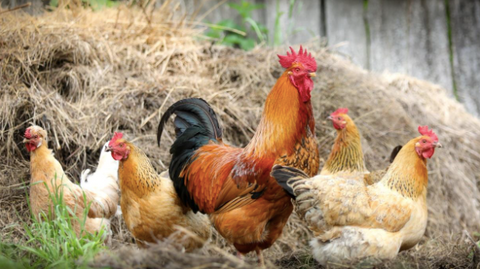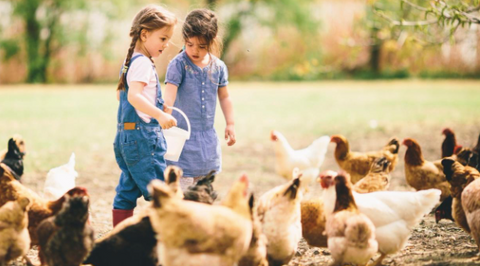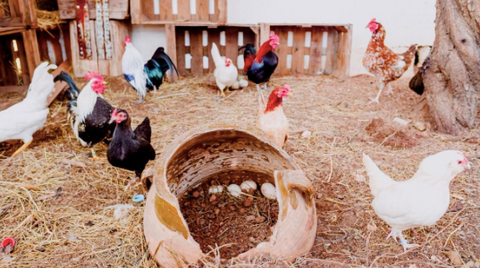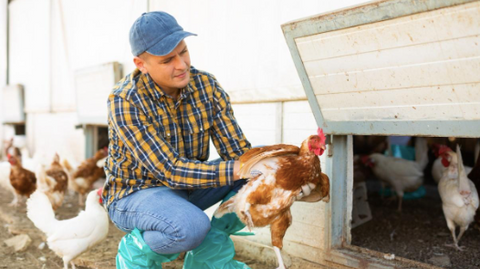Natural Ways to Boost Egg Production
How can we naturally boost egg production in chickens while ensuring their well-being and vitality?
Egg production is crucial to raising chickens, whether for personal use or as part of a more extensive farming operation. Understanding how to naturally boost egg production in chickens can improve your flock's health and well-being and increase the yield of nutritious eggs.
In this guide, we'll explore various methods for encouraging chicken egg-laying, focusing on natural approaches that benefit your chickens' well-being.
Additionally, we'll explore how homeopathy, a holistic approach to health and wellness, can enhance egg production.

Why Egg Production Matters
Eggs are a valuable source of protein and nutrients for humans, making them a staple in many diets worldwide. For those who raise chickens, consistent egg production ensures a steady supply of fresh, high-quality eggs for personal consumption or sale.
Egg Booster provides natural stress relief for chickens, promotes stronger eggshells, and boosts egg production.
By combining natural methods with homeopathic remedies, chicken farmers can create an environment that supports optimal egg production while promoting the health and vitality of their flock.
In the following sections, we'll explore these techniques in more detail and offer practical insights and tips for success.
Understanding Egg Production in Chickens
Eggs are a vital part of chicken farming, and understanding how they are produced can help us encourage more of them from our hens. Let's take a closer look at the process:
Egg-Laying Cycle
Chickens have a natural cycle for laying eggs. This cycle typically starts when they reach maturity, usually around 5-6 months old for most breeds. Once mature, hens enter a cycle where their bodies develop and release eggs. This cycle can be influenced by various factors such as daylight length, nutrition, and overall health.
Factors Influencing Egg Production
Several factors affect how many eggs a hen lays and how often. The breed of chicken plays a role, as some breeds are naturally better layers than others. Age also matters as hens tend to lay more eggs when young and gradually lay fewer as they age.
Nutrition is crucial for egg production. Hens need a balanced diet rich in protein, vitamins, and minerals to lay eggs regularly. Environmental conditions, including temperature and humidity, can also impact egg production. Stress, illness, and disturbances can disrupt the laying cycle, leading to fewer eggs being produced.
Managing the Egg-Laying Cycle
To maximize egg production, managing the factors that influence the egg-laying cycle is essential. Providing a nutritious diet tailored to the needs of laying hens ensures they have the energy and nutrients necessary for egg production.
Maintaining consistent lighting conditions is also essential, as hens rely on daylight length to regulate their laying cycle. Clean and comfortable nesting areas encourage hens to lay eggs in a safe and stress-free environment.
Minimizing stressors such as predators and disturbances helps maintain a healthy and productive flock and can naturally encourage higher egg production in chickens.
Natural Methods to Encourage Egg Laying
Many chicken farmers prefer natural techniques to encourage egg laying instead of relying solely on artificial methods or medications. These methods prioritize the chickens' health and happiness, leading to sustainable egg production in the long run.
Natural methods can be highly effective when it comes to boosting egg production in chickens. These approaches focus on providing the right conditions and care to support the chickens' natural instincts.
Let's explore some of these methods in detail.
Optimal Nutrition for Egg Production
As mentioned above, providing the right food for your chickens is crucial for them to lay eggs regularly and stay healthy. Here's what you need to know about their diet:
Balanced Diet:
- Chickens need a variety of nutrients to stay healthy and produce eggs.
- Their diet should include a mix of grains, such as corn and wheat, and protein sources like soybean meal or fish meal.
- Calcium is essential for eggshell formation, so crushed oyster shells or limestone should be provided.
Nutritional Deficiency provides natural support for nutritional deficiency. It was designed for optimal digestion and nutrient absorption, and it promotes overall strength and vitality.
Vitamins and Minerals:
- Chickens also need vitamins and minerals to support their overall health and egg production.
- Vitamin A helps maintain healthy eyesight, while vitamin D aids calcium absorption.
- Minerals like phosphorus and potassium are essential for bone strength and muscle function.
Supplements:
- In addition to their regular feed, chickens can benefit from certain supplements to boost egg production.
- Omega-3 fatty acids, found in flaxseed or fish oil, can improve the quality of eggs.
- Probiotics and prebiotics help maintain a healthy gut, essential for nutrient absorption and overall health.
Fresh Water:
- Along with food, chickens need access to clean, fresh water at all times.
- Water is essential for digestion, nutrient transport, and temperature regulation.
- Ensure their water is free from contaminants and changed regularly to keep it clean.
Feeding Routine:
- Establishing a consistent feeding routine helps ensure that chickens receive the nutrients they need to lay eggs regularly.
- Feed them at the same time each day and monitor their food intake to prevent overeating or underfeeding.

Providing Adequate Lighting
Lighting plays a crucial role in regulating the egg-laying cycle of chickens. Here's how you can ensure your hens have the right lighting conditions:
Natural Light:
- Chickens rely on natural sunlight to regulate their internal clocks and laying cycle.
- Exposure to daylight signals to hens that it's time to lay eggs.
- Ensure that your coop has windows or openings that allow natural light to enter, giving your chickens access to daylight.
Artificial Lighting:
- In regions with short daylight hours, supplemental artificial lighting can help extend the daylight hours for chickens.
- You can simulate longer days by providing artificial light in the morning and evening, encouraging hens to lay eggs throughout the year.
- Use timers to automate the lighting schedule and maintain consistency.
Duration and Intensity:
- The duration and intensity of light exposure are essential factors in stimulating egg production.
- Hens typically require around 14-16 hours of light daily for optimal egg laying.
- Ensure the lighting is bright enough to mimic natural daylight but not too harsh, as this can cause stress.
Seasonal Adjustments:
- As daylight length naturally varies throughout the year, adjust your lighting schedule accordingly.
- Increase artificial lighting during winter when daylight hours are shorter to maintain egg production levels.
- Conversely, artificial lighting should be reduced during the summer when natural daylight is abundant.
Creating Comfortable Nesting Areas
Comfortable nesting areas are essential for encouraging egg-laying behavior in chickens. Here are some steps to ensure your nesting areas are conducive to egg production:
Designing Nesting Boxes:
- Provide nesting boxes that are spacious enough for hens to comfortably enter and turn around.
- The boxes should have low fronts to allow easy access and high backs to provide privacy.
- Construct the nesting boxes using sturdy materials such as wood or plastic, ensuring they are durable and easy to clean.
Cleanliness and Hygiene:
- Keep the nesting areas clean and free from debris, droppings, and parasites.
- Regularly remove soiled bedding and replace it with fresh, clean bedding to maintain hygiene.
- Dirty nesting areas can deter hens from laying eggs and increase the risk of egg contamination and disease.
Placement and Location:
- Position the nesting boxes in a quiet and secluded coop area away from high-traffic areas and disturbances.
- Chickens prefer to lay their eggs in quiet, private locations where they feel safe and secure.
- Ensure adequate ventilation and temperature control in the nesting area to prevent overheating or drafts.

Monitoring and Adjustment:
- Monitor the usage of nesting boxes regularly to ensure they are being utilized by your hens.
- If you notice issues such as overcrowding or reluctance to use the nesting boxes, make adjustments as needed.
- Provide additional nesting boxes or modify existing ones to better suit the needs of your flock.
Ensuring Proper Hydration
Hydration is essential for the health and productivity of your chickens. Here's how you can ensure they stay properly hydrated:
Access to Clean Water:
- Ensure your chickens have access to clean, fresh water at all times.
- Provide waterers that are easy to clean and refill, and regularly check for any contaminants or debris that could affect water quality.
Placement of Waterers:
- Position waterers in areas where chickens can easily access them without overcrowding.
- Place them at a comfortable height to prevent spillage and contamination.
- Consider placing multiple waterers throughout the coop or run to ensure all chickens have easy access.
Monitoring Water Consumption:
- Pay attention to how much water your chickens are drinking.
- Increased water consumption can be a sign of hot weather or high egg production. In contrast, decreased water intake may indicate health issues or stress.
- Monitor water levels regularly and refill as needed.
Winter Considerations:
- In colder climates, take extra precautions to prevent water from freezing during winter months.
- Use heated waterers or insulate existing waterers to ensure chickens have access to liquid water at all times.
- Dehydration can be a significant issue in winter, so water consumption must be monitored closely.
Managing Stress and Predation
Chickens can experience stress, which can negatively impact their health and egg production. Additionally, predators pose a threat to your flock. Here's how you can manage stress and predation:
Stress Reduction:
- Minimize stressors in your chickens' environment by providing a calm and safe space for them to live.
- Avoid sudden loud noises or disturbances that could startle them.
- Keep their living area clean and well-maintained, as a dirty environment can cause stress. Gradually introduce new chickens to the flock to reduce social stress.
Predator Deterrence:
- Protect your chickens from predators by securing their coop and run.
- Use sturdy fencing and hardware cloth to prevent predators from digging underneath or climbing over.
- Install locks and latches on coop doors to keep predators out at night.
- Consider using motion-activated lights or sound deterrents to scare away potential threats.
Vigilance:
- Stay vigilant and observant of your chickens' behavior and surroundings.
- Look for signs of stress, such as feather picking or unusual vocalizations, and address any potential stressors promptly.
- Look for signs of predator activity, such as tracks or droppings, and take steps to reinforce security measures.
Maintaining a Healthy Flock
Keeping your chickens healthy is crucial for maintaining optimal egg production and overall well-being. Here are some essential steps to maintain a healthy flock:
Regular Health Checks:
- Monitor your chickens regularly for any signs of illness or injury.
- Look for symptoms such as lethargy, reduced appetite, abnormal droppings, or unusual behavior.
- Perform routine health checks, including checking their eyes, feathers, and feet, to catch any issues early.

Preventive Measures:
- Take proactive steps to prevent common health problems in chickens.
- Keep their living area clean and dry to reduce the risk of disease.
- Practice good biosecurity by limiting exposure to outside birds and regularly disinfecting equipment and supplies.
- Provide a balanced diet and access to clean water to support their immune system.
Better Breathing promotes easy breathing by minimizing respiratory discomfort and wheezing.
Parasite Control:
- Parasites such as mites, lice, and worms can affect your chickens' health and egg production.
- Implement a regular parasite control program using safe and effective treatments.
- Keep their coop and nesting areas clean, as parasites thrive in damp and dirty environments.
Quarantine Procedures:
- Introduce new chickens to your flock cautiously and quarantine them for a period of time before integrating them fully.
- This helps prevent the spread of diseases and parasites to your existing flock.
- Observe new arrivals for any signs of illness during the quarantine period.
Emergency Preparedness:
- Have a plan for emergencies, such as disease outbreaks or severe weather events.
- Keep essential supplies, including first aid supplies, medications, and extra feed and water.
- Know how to contact a veterinarian in case of emergencies and be prepared to take swift action to protect your flock's health.
Injuries Support was designed for injury care. It promotes natural healing and it is useful in reducing swelling and discomfort.
By implementing these natural methods, you can create an environment that supports and encourages egg production in your chickens. Remember to observe your flock closely and adjust as needed to ensure their health and happiness.
Homeopathic Approaches to Boost Egg Production
Homeopathy offers a natural and holistic approach to enhancing egg production in chickens. It involves using highly diluted substances derived from plants, minerals, or animals to stimulate the body's self-healing abilities.
Homeopathic Remedies for Egg Production
Several homeopathic remedies can be used to support egg production in chickens. These remedies are chosen based on the individual bird's symptoms and overall health condition. Some common remedies include:
1. Caulophyllum: This remedy is often used to stimulate egg production in hens experiencing difficulties laying eggs, such as egg binding or irregular laying patterns.2. Sepia: Sepia is beneficial for hens who are sluggish or lethargic and may be experiencing a decrease in egg production due to hormonal imbalances.
3. Calcarea carbonica: This remedy is helpful for hens who are prone to stress or anxiety, which can negatively impact egg production.
4. Pulsatilla: Pulsatilla is indicated for hens that exhibit erratic laying patterns or have stopped laying altogether due to environmental changes or stressors.
These remedies are highly diluted and can be given orally or added to the chickens' drinking water.
Administration and Dosage
Homeopathic remedies for chickens are typically administered in pellet or liquid form. The dosage and potency of the remedy depend on the individual bird's symptoms and response to treatment. It's essential to consult a veterinarian or homeopathic practitioner experienced in treating poultry to determine the appropriate remedy and dosage for your flock or check products’ recommendations.
Integrating Homeopathy with Conventional Practices
By combining homeopathy with conventional practices, you can take a holistic approach to chicken health and egg production. This integrated approach prioritizes the well-being of your flock and offers a comprehensive solution to common challenges in poultry farming.
Consult with professionals and closely monitor your chickens' response to treatment to achieve optimal results.

The Bottom Line
Implementing natural methods and integrating homeopathy into your chicken farming practices can significantly enhance egg production while promoting the health and well-being of your flock.
By prioritizing factors such as nutrition, environment, light management, comfortable nesting areas, proper hydration, managing stress and predation, and maintaining a healthy flock, you create an optimal setting for your chickens to thrive and lay eggs consistently.
Incorporating homeopathic remedies alongside conventional veterinary care, will provide comprehensive support for your flock's health and vitality. It's essential to approach chicken farming with a sustainability mindset and respect for the animals in your care.
By implementing natural and holistic practices and prioritizing their welfare, you increase egg production and contribute to the overall health and happiness of your chickens.












